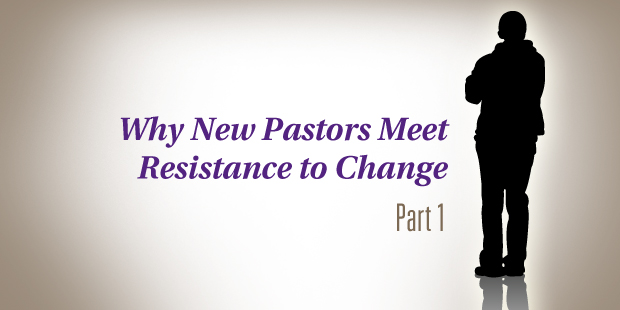
Why New Pastors Meet Resistance to Change, Part 1
“It’s my first week, what should I change here?” Perhaps new pastors don’t vocalize the question, but I know they think it. At least, I don’t believe I’m the only one. The default setting to change something is only natural for a good leader. Having a vision means being dissatisfied with the status quo.
“The search committee said they were bringing me on to make needed changes. Why is the church resisting the obvious?!” Why have so many pastors’ honeymoons ended after the first month? Resistance to change is one of the largest hurdles in leadership. I once had a handful of pencils launched my way when my tweaks to a potluck dinner were discovered. I learned not to mess with potlucks. Luckily the pencils weren’t that sharp, and they no longer contain lead. No blood, no foul.
Every church leader has been there. We’ve all met the resistance. Here are a few reasons why people resist change.
You are the change. New pastors often miss this fact. Even if you change nothing—and I mean absolutely nothing—in your first year as a pastor, then people will still experience a huge change: you. You are not new to yourself, but you certainly are new to the people of the church. Any change efforts you introduce in your first few months are only magnified by the fact that people are still trying to get to know who you are.
Technical change and cultural change. When people say they want change, they often mean technical changes. Technical problems require a specific expertise. For many, pastors are seen as the hired expert on hand to work through technical problems. People desiring technical changes ask these types of questions: Can you make sure my curriculum is in my room? Can you see that church is not so hot in the summer? Why haven’t I received the newsletter? These questions involve small technical changes, but often people desire large technical changes too, like a new building.
Technical changes are important. If you pastor a church of any size, then you must manage the organization of people. Few people, however, understand that lasting change is cultural, not technical. Cultural problems are not solved by just a technical expert, but rather these changes involve a general acceptance of everyone. If you are a leader, then you’re most likely gravitating towards the cultural changes you believe need to be made. That’s what leaders do. They challenge the status quo. But you must realize that very few people in your church default to cultural changes. There’s a reason why some things get imbedded in the culture of a church. Most people find them acceptable. Early in your leadership, win people over with easy technical changes before launching into major cultural changes.
Lack of trust with those who propose the change. Just because people like you and send nice cards in your first month doesn’t necessarily mean they fully trust you. Even when people respect the office of pastor, not knowing the person who fills that spot often leads to a cautious acceptance from the congregation. Respect and trust are two different mindsets. People may respect you while not fully trusting you. Earn their trust by honoring their respect before making big moves.
Beliefs that change is not necessary. It’s a key question: Do the people I’m leading even recognize the need for change? If the current way appears successful, then the evidence of a problem is hidden from the plain sight of the people. As the leader, you may have the advantage of inside organizational knowledge. A knowledge to which the average churchgoer may have zero exposure. Before you implement a change effort, you have to show people the hidden problem.
Beliefs that change is not feasible. Even if everyone agrees that change would be good, not everyone may agree that change is feasible. It’s easier to show people the problem than it is the feasibility of fixing the problem. Getting people to agree on a common problem is not enough. To enact lasting change, you must also show them how the solution is feasible.
Loss of position, status, and power. People will resist a change effort if it reshuffles the power alignment. Rare is the breed of person who willingly gives up position, status, or power without some resistance. This resistance makes sense. If someone challenged your position, then you would likely resist that effort as well. Though people are rightly repulsed by the idea of the church being a political organization, forming political allies is a necessity in every organization. Before you challenge the current power structure of a church, serve and befriend the power brokers. If you can win them over, then you will have their help in enacting long-term cultural changes.
Threats to values and ideals. People react emotionally when you challenge their values and ideals. When change is viewed as an assault on a current set of ideals and values, you can expect widespread resistance. These values may not be what’s formally published in the constitution and bylaws. The only way to uncover these values and ideals is to spend time with different people. Detached pastors will never know the unspoken—yet well understood—values of their congregants.
Change is likely to occur when the people within an organization believe the benefits of making the change outweigh the costs of making the change. This attitudinal shift doesn’t come easily or quickly!
Coming in Part 2: Why change in churches is difficult even after people stop resisting the change effort

Tags: Change, Leadership Engine, Sam Rainer, Staff











